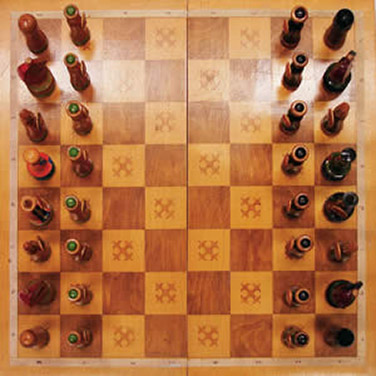Chess

The chess board consists of an eight-by-eight grid of black and white squares. The two players start out with sixteen black and sixteen white pieces. They then take it in turns to move according to predefined rules and try to take the opponent’s pieces while protecting their own. The winner is the player who "checkmates" the opponent’s king. The game can also be won if the opponent concedes defeat, or end in a draw.
History
Although the origins of chess are not entirely clear, most researchers agree that it came from India. The Indian game "Chaturanga" is regarded as an ancestor of chess, which is believed to have reached Persia in around the mid-sixth century. The game was continued by the Arabs under the name "Shatranj", refined and brought to Greece and Spain in the early Middle Ages. From the ninth century, it spread throughout Europe in a constantly changing form. The first written references in European literature date back to the eleventh century. In the fifteenth century, the rules of the game underwent a major reform, transforming chess into the swift, dynamic game it is today. The history of modern chess competitions began with the London tournament in 1851.
Mathematics
No sooner had the computer been developed that the first simulations of chess were designed. Ever since the surprising victory of Deep Blue, a programme which ran on an IBM computer, over chess world champion Garri Kasparov in 1997, it has been clear that computers are capable of beating humans. Programmes like Deep Blue and its successors do not seek the best solution. Instead, they test all the possibilities for several moves in advance and select the move which gives the opponent the least number of opportunities to win. However, the game in all its complexity is not solved in the process: winning strategies can only be calculated for end games without many pieces.